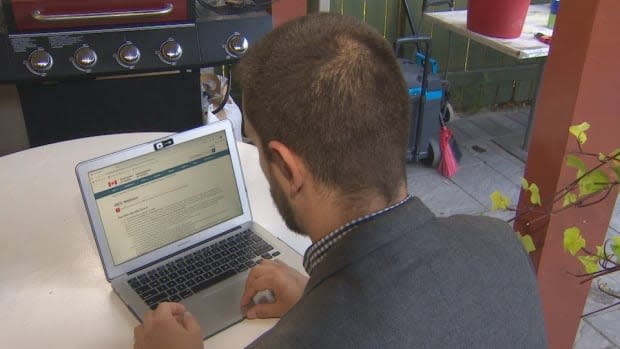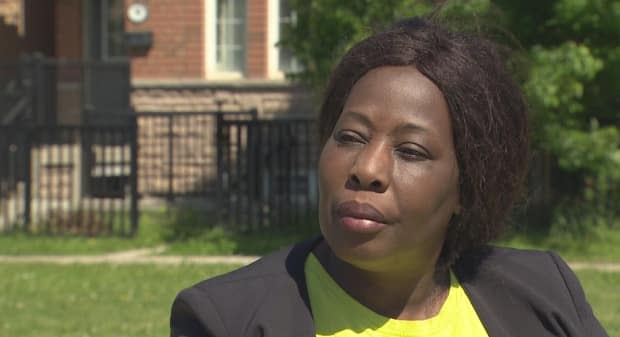Few LGBTQ+ refugees got to Canada during the pandemic. Here are the stories of some who did

Warning: Details and testimonies contained in this report may be distressing for some readers.
João Araújo says he was thankful the Canadian government granted him refugee status last year. As a gay man, he didn't feel like he could live his life back home in Brazil without fear of judgment and violence.
But settling in Canada during the pandemic proved to be a challenge. Araújo, who CBC News granted anonymity to protect his family back home, has been waiting for nearly 10 months for the immigration office to sort the paperwork that would allow him to visit his sick mom.
And he can't help but feel that now that he's here, Canadian authorities aren't moving as quickly to deal with his case.
"When you think your life is at risk, you don't think too much about what's going to happen after, you just want to leave your country," said Araújo.
"It's really difficult because I chose to find refuge here to be safe, but at the same time, I feel like I'm missing something: my family."

The COVID-19 pandemic not only significantly decreased the number of LGBTQ+ refugees let into the country, but also disrupted settlement and integration for those who did manage to get in. Immigration authorities have been approving an increasing number of applications since COVID-19 restrictions loosened, but experts say it'll take a long time to get fully back up to speed.
"There's a huge backlog. Refugee resettlement is at the lowest point it has ever been," said Kimahli Powell, executive director of Rainbow Railroad, a Toronto organization that helps LGBTQ+ people flee persecution.
He adds there's over 90 million displaced people around the world, the highest number recorded since the Second World War.
"There needs to be a dramatic effort to catch up."
Finding community
Maïmouna Diomande, who identifies as bisexual, left Ivory Coast to settle in the GTA with her niece two months before the pandemic hit.
Before the pandemic, she was already dealing with the difficulty of learning English and adapting to Canadian winters. When COVID-19 struck, it became even more difficult to meet people, get access to newcomer services and find other supports as an asylum seeker.
But coming from a place where she was raped, eventually forced by family to marry after getting impregnated, and where her own lover was stabbed to death, she'd do it all over again.

"It really wasn't easy; it wasn't easy at all for me. But as soon as I had the chance, the opportunity to come here, I jumped on it," said Diomande.
But arriving to Canada doesn't mean the end of her struggles. She now hopes to one day bring her three children — now aged 30, 20 and 13 — to Canada.
The 53-year-old found community in Toronto through the organization FrancoQueer, an integration organization that helps Francophone LGBTQ+ newcomers settle in the GTA. But it wasn't easy for those running the group to make that happen the past two years. It's only been in recent months that they've been able to return to in-person services.
It was difficult for staff to reach newcomers remotely, since many don't have the technology available to them, says Nicolas Arnaud-Goddet, the program manager at FrancoQueer. In normal times, staff helped them create resumes, meet people and get to know their new city.
"All that was not possible and that really affected the mental health of the people who joined us," said Arnaud-Goddet.
Arnaud-Goddet says racism and homophobia still exist in Canada and can still affect the LGBTQ+ refugees who come here looking to escape those very same things.
"There is still a lot of work to be done."
Moving out of the pandemic
Rainbow Railroad helped around 200 people relocate to other countries out of 8,500 requests for help last year. Only four moved to Canada — less than a quarter of the annual average before the public health crisis.
"When a Canadian-based organization is more successful at bringing people to countries other than our own, you have to do better," said Powell, who hopes to strike a long-term agreement with the federal government to bring LGBTQ+ refugees here.

For now, several governments, including Canada's, rely on the United Nations High Commissioner for Refugees (UNHCR) to assess applications based on vulnerability.
Isabelle Dubois, a spokesperson for Immigration, Refugees and Citizenship Canada (IRCC) said in an email to Radio-Canada that while the ministry relies on the UNHCR for refugee resettlement, it still works with private sponsors like Rainbow Railroad to help LGBTQ+ refugees specifically.
That's what happened last year, when thanks to a one-off agreement with the federal government, Rainbow Railroad received some 4,000 requests for help in the wake of the Taliban's takeover of Afghanistan last summer.
While Rainbow Railroad has not entered into a formal agreement for Ukrainian refugees, it has received nearly 160 applications since the start of the Russian invasion, Powell says.
"We hope that an ongoing referral partnership will make it easier to collaborate and welcome people to our country."

